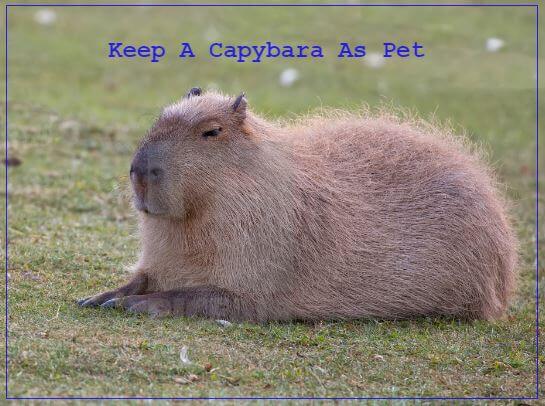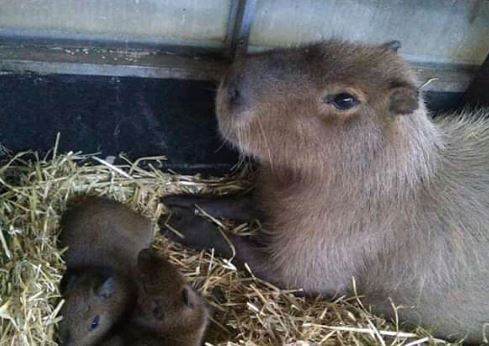Capybara After Birth Care
This is a topic that all capybara owners should know about, but many find difficult to learn.
Caring for a capybara after birth is a topic that all capybara owners should know about, but many find difficult to learn. It involves several critical components, such as maintaining the right humidity and temperature during gestation, ensuring you have enough space for your baby capybaras to play once they are born, and providing a healthy diet of grasses, plants, and grains. There are many ways to learn about it: you can read books or search online, or consult with experts in the field. Many people don’t know about it!
Proper care for capybara after birth is extremely important. Once your capybara has given birth, it’s important to make sure that both the baby and its mother are healthy, safe and cared for properly.
Make sure your capybara has access to plenty of water and food
Capybaras need fresh water available to them at all times. If you have a pet capybara in captivity, be sure to replace their water daily with fresh water. Even if they don’t appear as though they’ve drunk much of their previous day’s supply, it is extremely important that you change the water regularly anyway.
Capybaras also need a healthy diet rich in vegetables
this will help ensure that they remain healthy during pregnancy and after birth.* Don’t leave the baby alone for long periods of time. Capybara babies are born fully furred and can swim within hours of being born; however, they still need time with their mother to learn how to survive on their own.
Don’t let other animals near the baby.
Many other animals (especially dogs) pose a danger to young child-capybaras.* Don’t let the baby sleep on its back. This can cause breathing problems for newborns because their lungs aren’t developed enough yet.
Some signs that you may have problems with your capybaras include aggression, anxiety, and aggression.
What are some signs that you may have problems with your capybaras?
• Aggression is one of the most common signs of trouble in a group. You might also see them acting aggressively towards humans or other animals.
• Anxiety is another common problem. Capybara are social animals and they’re supposed to be comfortable with people, so if you’ve got one that’s not, then it could be an indication of stress or fear.
• If they don’t want to be touched or held after birth then this could also suggest problems. It’s very important that newborns receive plenty of attention and affection throughout their first few weeks so make sure yours does too! If it seems like something is wrong, it probably is – so take them to see their vet as soon as possible for advice on how best to cope with these issues together.”
If you have any concerns about your capybara’s behavior, talk to your vet immediately.
After birth, your capybara may be in discomfort, so you should make sure to give her plenty of food and milk. You can bottle-feed the babies if they don’t feed on their mother after a few hours.
It’s important to get your capybara accustomed to being handled when she’s young so that she doesn’t become nervous or scared when it’s time for her to mate.
If you have any concerns about your capybara’s behavior, talk to your vet immediately. Your veterinarian can help you develop a plan for your capybara’s needs after birth.
You probably don’t think about what will happen to your capybara after it has given birth, but it is a good idea to develop a postpartum plan. Your veterinarian should be your first port of call when you’re making such a plan. That’s because he or she can help you figure out how to care for your capybara once it’s had its babies.
After giving birth, your capybara will need plenty of sleep and rest—just like humans. It won’t be able to put much weight on its feet, so it’s best if you keep them in a protected area until they’re strong enough to walk (we recommend a playpen). If possible, move the cage where they are staying out of the sun—the heat can cause diarrhea and dehydration, which could result in death.
The day after giving birth is crucial for the survival rate of newborn capybaras: all of their organs are still developing, so they need lots of warmth from their mother (or from machines if this isn’t possible). If their temperature drops below 97 degrees Fahrenheit (36 degrees Celsius), their hearts could stop beating and they may die within minutes without intervention!
It’s important to remember that all babies are different and will react in their own way when they come into contact with new people and things.
This is very important to remember. Many capybaras are curious and will try to investigate anything new in their environment, but some may be afraid of new things, especially if they don’t occur frequently or aren’t present often. This can make it difficult for the capybara to tell the difference between a person and another animal. Just because a capybara was interested in you when you first met doesn’t mean that it will always be interested in you, so don’t assume that every time you walk into a room with your baby capybara it will run right up and sniff your hand or give you kisses like it did last time.
It’s also important to note that not all babies are alike. Some babies may become upset by a new person entering their cage while others may not care at all; some babies might enjoy being cuddled while others prefer to sleep on their own; some babies might like having lots of toys around while others might only want one toy and then those other toys just get ignored; some babies might like being petted while others would prefer not to be touched.
Some of the most common symptoms of bonding issues are aggression and anxiety.
Bonding issues are very common in capybaras. You may have a hard time bonding with your newborn baby or they may have a difficult time bonding with other people. Common symptoms of bonding issues include aggression, anxiety, crying, and being distracted by other babies and things around them. If you notice any of these symptoms in your newborn baby, try to get help as soon as possible so that you can solve the problem before it gets worse!
A good sign is if your baby looks at you when it makes eye contact with someone new, but doesn’t make contact with anyone else.
One of the most important things to remember about capybaras is that they are extremely social animals. They like being around people and other animals. If you think your baby capybara may be unhappy, try spending more time with it. If that doesn’t work, try getting another animal for your baby to play with.
It’s also a good sign if your baby looks at you when it makes eye contact with someone new, but doesn’t make contact with anyone else. That means they are comfortable around you and don’t feel threatened when in close proximity to other people or animals.
If this happens often, then there may be a problem.
Your capybara is likely to be on edge after the birth, and this can lead to some aggressive behavior between him or her and his mate. The new mother may attempt to attack her mate, other pets in the home, or you. It’s important not to ignore any signs of aggression.
If your capybara’s behavior seems off right after giving birth—or if it continues for longer than two weeks—take them in for a checkup with their vet as soon as possible. They will also be able to give you advice on how to care for your pet during this difficult time and develop a plan that works for your family and your pet’s needs

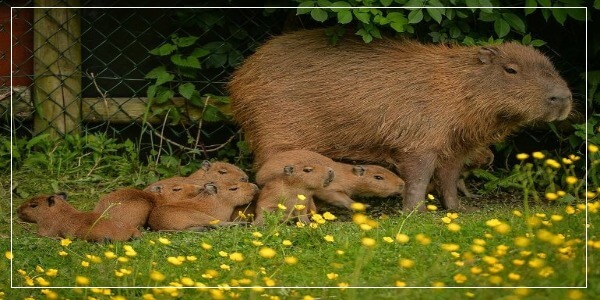
![Capybara Meat And Its Culinary Uses - [Every You Should Know] Capybara Meat & Culinary Uses](https://capybaratips.com/wp-content/uploads/2023/03/Capybara-meat-250x200.webp)
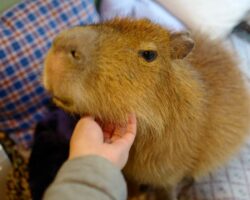
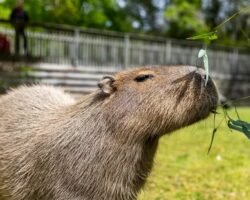
![How Big Should a Capybara Enclosure Be? - [Sizes & Design] How Big Should a Capybara Enclosure Be](https://capybaratips.com/wp-content/uploads/2023/03/Capy-Enclosure-250x200.webp)
![Where Can I Buy a Capybara Near Me? - [Recommended] Where Can I Buy a Capybara Near Me](https://capybaratips.com/wp-content/uploads/2023/03/Near-Me-250x200.webp)
![How To Get a Pet Capybara Uk [Step By Step] How To Get a Pet Capybara Uk](https://capybaratips.com/wp-content/uploads/2023/03/Uk-Capybara-250x200.webp)
